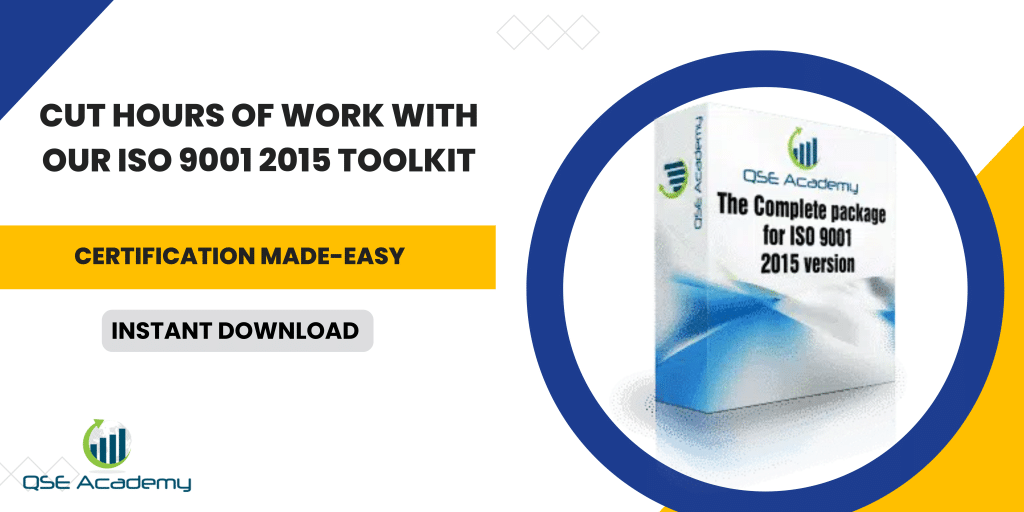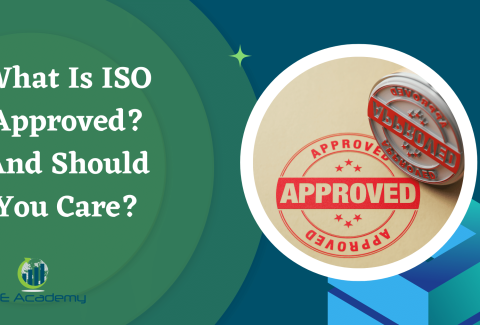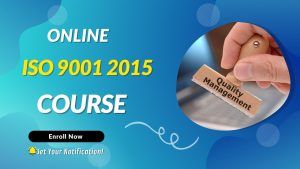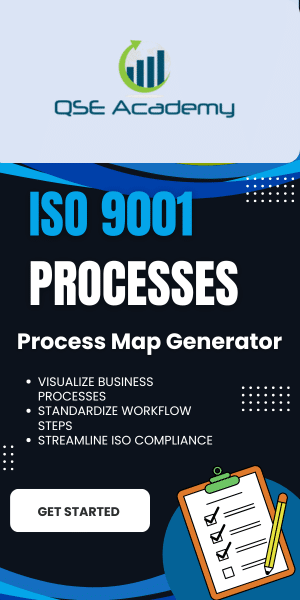What is ISO 9001 and why is it important?
Last Updated on October 13, 2025 by Hafsa J.
What is ISO 9001 and why is it important?
ISO 9001 gets thrown around a lot—but ask most business owners what it actually means, and you’ll get vague answers like “quality certification” or “something for big companies.” That’s a missed opportunity.
In my 10+ years helping organizations—from small food manufacturers to international suppliers—build ISO 9001 systems that actually work, I’ve seen what this standard can really do. It’s not just about passing audits or checking a box. When implemented right, it becomes the backbone of how a business delivers value, earns trust, and scales with confidence.
If you’re here, you’re probably trying to figure out:
-
What ISO 9001 actually is (without the jargon),
-
Whether it applies to your business,
-
And if it’s worth the time, effort, and cost.
This guide is designed to give you real clarity—not textbook definitions. You’ll get a clear breakdown of what ISO 9001 means, why it matters, and how to decide if it’s the right strategic move for your company. Plus, I’ll point you toward deeper guides depending on where you are in your journey—whether you’re just exploring or ready to start the process.
Let’s get into it.
What Does ISO 9001 Actually Mean?
If you’ve ever googled ISO 9001, you’ve probably seen phrases like “international standard for quality management systems.” Helpful? Not really.
So let’s break it down simply.
ISO stands for the International Organization for Standardization. They publish global standards that help businesses work more efficiently and deliver consistent quality.
9001 is just the number assigned to the standard focused on Quality Management Systems—basically, how you run your operations to meet customer expectations and improve over time.
And 2015? That’s the latest version of the standard. ISO 9001:2015 introduced important changes like a stronger focus on risk-based thinking, leadership involvement, and aligning your quality objectives with your overall business strategy.
So what does it actually mean for your business?
It means putting in place a system that helps you:
-
Do things consistently, even when the team changes
-
Catch issues before they turn into complaints
-
Keep improving your processes without reinventing the wheel every 6 months
In my experience, when clients finally understand this, they stop seeing ISO 9001 as a burden—and start seeing it as a growth tool.
One of my clients—a small logistics company—thought ISO was overkill for their size. But after 3 months of applying the principles, they reduced order errors by 62%. Not because they worked harder, but because their process finally worked for them.
Related topics you’ll want to explore:
Why ISO 9001 Exists—and Why It Matters
ISO 9001 isn’t just about having a few documented procedures. It was created to solve a real business problem: inconsistency.
Companies were delivering products late, making quality mistakes, losing customer trust—and no one had a repeatable system to fix it. That’s where ISO 9001 stepped in.
At its core, ISO 9001 is about building a system that helps you deliver what you promised, every time.
And that’s exactly why it still matters—especially today.
Here’s what it actually does for your business:
-
Puts your operations on autopilot
You don’t have to depend on one person knowing “how things are done.” The process becomes the expert, not the employee. -
Catches risks before they cost you
ISO 9001 pushes you to think ahead—spot weak points, fix root causes, and prevent issues before they snowball. -
Builds trust—internally and externally
Your team knows what’s expected. Your customers get consistency. Your partners know you’re reliable.
I once worked with a food SME that had constant customer complaints about packaging errors. We didn’t overhaul the entire system—we just mapped their key processes, added two simple checks, and the complaints dropped by 90% within two months.
That’s the power of structure. Not just control for control’s sake, but clarity and consistency that create room for growth.
Want to go deeper? These articles break it down:
Who Needs ISO 9001 Certification?
Here’s a common myth I hear all the time:
“ISO 9001 is only for big manufacturers or export businesses.”
Not true.
I’ve worked with micro-enterprises, startups, local food producers, logistics teams, industrial manufacturers—even digital service providers. And they all had one thing in common: they wanted to grow without chaos.
So, who actually needs ISO 9001?
-
Companies bidding on contracts
If you want to win public tenders, international clients, or large supply chain deals, ISO 9001 is often required—or at least expected. -
Businesses scaling fast
Growth is great. But without systems, it turns messy. ISO 9001 gives structure without killing flexibility. -
SMEs that want trust and leverage
When you’re smaller, clients look for proof you’re serious. ISO 9001 gives them confidence—and gives you a competitive edge.
One client—a 6-person agri-food startup—landed a national supermarket contract because they had ISO 9001 in place. The buyer literally said, “We chose you because you already have quality systems—we don’t have time to babysit suppliers.”
And if you’re wondering…
Yes, solo entrepreneurs and small teams can get certified too—if the scope makes sense and your processes are documented.
Related articles to explore next:
What ISO 9001 Certification Brings to Your Business
Let’s talk outcomes.
A lot of people think ISO 9001 is just a “compliance badge”—a way to tick a box for clients or regulators. And sure, it can do that. But if that’s all you use it for, you’re leaving serious value on the table.
In reality, ISO 9001 gives you a business advantage that touches everything: efficiency, credibility, team alignment, and long-term profitability.
What I’ve seen it do, again and again:
-
Win bigger clients, faster
Certified businesses get through procurement filters quicker. In regulated industries, it’s often the price of entry. -
Reduce waste and firefighting
One logistics company I worked with cut repeat mistakes by 70%—just by mapping their processes and assigning clear responsibilities. -
Improve team accountability
When roles, expectations, and quality objectives are clear, teams stop guessing and start delivering. -
Build trust with data
ISO 9001 doesn’t just ask you to make improvements. It teaches you to measure them—so you know what’s working, and what’s not.
One of my industrial clients told me, “We finally have a system that tells us when something’s wrong—before a customer does.”
And that’s the difference: reactive vs proactive.
ISO 9001 isn’t just a certificate.
It’s a business system that helps you stop depending on heroic effort and start building reliable, scalable operations.
Next step if this resonates:
ISO 9001 vs Other Standards: Know the Difference
Here’s where a lot of businesses get stuck:
“Wait—should we go for ISO 9001, or do we need something else like ISO 14001 or ISO 22000?”
It’s a valid question. Because while ISO 9001 is the foundation, there are dozens of standards—each built for specific sectors or priorities.
Here’s how I usually explain it to clients:
| Standard | Focus Area | Who It’s For |
|---|---|---|
| ISO 9001 | Quality Management | Any business, any size |
| ISO 14001 | Environmental Management | Businesses with environmental impact or regulation |
| ISO 22000 | Food Safety Management | Food industry, farm to fork |
| ISO/TS 16949 | Automotive Quality Management | Automotive manufacturers and suppliers |
| ISO 13485 | Medical Device Quality Management | Medical and healthcare product manufacturers |
| ISO 9000 | Terminology and fundamentals of QMS | Reference standard—not certifiable |
| ISO 9002 | (Outdated) | Replaced by ISO 9001 |
| AS9100 | Aerospace Quality Management | Aerospace industry (builds on ISO 9001) |
For example: I had a client in food manufacturing who originally thought they needed ISO 22000. But after reviewing their operations and target markets, we went with ISO 9001 first—it was faster to implement and opened doors immediately. They later layered in food safety controls when scaling exports.
Key takeaway:
-
ISO 9001 is the most versatile starting point
It’s often the best first step—even if you later pursue sector-specific certifications. -
Other standards build on ISO 9001
Most industry-specific standards either complement or extend ISO 9001 requirements.
Related articles that dig deeper:
Is ISO 9001 Still Relevant Today?
Short answer? Yes. More than ever.
I get asked this all the time—especially by fast-moving startups or tech-driven teams:
“Isn’t ISO 9001 outdated? We’re agile. We use tools. We’ve got dashboards—why add this?”
Here’s the truth: ISO 9001 is not about slowing you down with bureaucracy.
It’s about giving your growth a backbone.
Why it still matters in 2025:
-
Risk is more visible—and less forgivable
In a hyperconnected world, one quality mistake can go public fast. ISO 9001 helps prevent that with real process discipline. -
Clients expect consistency, not chaos
Whether you’re B2B or B2C, reliability builds trust. ISO 9001 proves you have systems—not just good intentions. -
It adapts with your business
ISO 9001:2015 is designed to be flexible. You don’t need 200-page manuals—you need a clear structure that grows with you.
One of my most agile clients—a 12-person SaaS firm—implemented ISO 9001 to land contracts with medical suppliers. They didn’t lose speed. They gained access to markets that demand maturity and traceability.
And here’s what most people miss:
ISO 9001 is not about perfection.
It’s about being able to show how you catch issues, learn from them, and get better each time. That’s what clients and partners respect.
Dive deeper with:
How to Know If You’re Ready for ISO 9001
You don’t need to be “perfect” to start working toward ISO 9001.
But you do need to be serious about improving how your business runs—because this standard isn’t about having documents. It’s about building a system that holds up under pressure.
From experience, you’re ready if…
-
You’re tired of firefighting
If your team is constantly reacting to problems instead of preventing them, ISO 9001 gives you a system to flip that dynamic. -
You already have processes—just not formalized
You’re doing the work. Now it’s time to capture it, standardize it, and improve it over time. -
You want to grow without breaking
If you’re scaling and can’t rely on tribal knowledge anymore, ISO 9001 gives you a reliable operational spine. -
Clients are asking questions you’re not sure how to answer
“Do you have a corrective action process?”
“How do you track quality objectives?”
These aren’t just annoying checklist items. They’re signs that the market expects more maturity—and ISO 9001 helps you meet that.
One of my recent clients came to me after losing a major deal because they couldn’t show a structured approach to quality. Three months later, with a basic ISO 9001 system in place, they closed a six-figure contract with a buyer who had previously walked away.
Not ready yet? Here’s where to start:
-
Get your key processes mapped
-
Set 2–3 clear quality objectives
-
Build a team mindset around consistency and ownership
You don’t need a certificate to start building a system.
But if certification is the goal, the sooner you lay the foundation, the smoother it’ll be.
Build your readiness with:
A Strategic Standard That Pays Off
ISO 9001 isn’t just a certification.
It’s a decision to lead your business with structure, clarity, and a long-term mindset.
Whether you’re a small team trying to scale without chaos, or a growing company ready to compete in bigger markets, this standard gives you more than compliance—it gives you control. And trust me, after helping businesses in food, industry, and services go from reactive to reliable, I can say with confidence: the ROI is real.
If you’ve made it this far, you’re not just curious.
You’re likely ready to take the next step—or seriously explore what that looks like.
Here’s what you can do next:
-
✅ Download the ISO 9001 Self-Checklist to assess where you stand today
-
✅ Book a free 15-minute call if you want expert feedback on your specific case
-
✅ Keep exploring the guides linked throughout this article to go deeper
ISO 9001 isn’t for businesses that want to look good on paper.
It’s for those who want to run better—day in and day out.
And if that’s you? I can help you get there.
Ready to move from ISO 9001 theory to implementation?
Get the exact tools you need to write your documentation, train your team, map your processes, and pass your audit—without wasted time or guesswork.
Whether it’s ISO 9001, ISO 22000, or the cosmetics-focused ISO 22716, I’ve spent my career I’m not here to call myself an expert—I prefer “enthusiast” because I truly love what I do. When I’m not writing about standards, you’ll probably find me playing Piano 🎹, connecting with people, or diving into my next big project💫. I’m an engineer specialized in the food and agricultural industry
make ISO standards less intimidating and more approachable for everyone.
turning complex jargon into clear, actionable steps that businesses can actually use.
There’s something incredibly rewarding about helping people navigate food safety and quality management systems
in a way that feels simple, practical, and even enjoyable.
I have a Master’s in QHSE management and over 12 years of experience as a Quality Manager
I’ve helped more than 15 companies implement ISO 9001, ISO 22000, ISO 22716, GMP, and other standards
My clients include food producers, cosmetics manufacturers, laboratories, and service companies
I believe quality systems should be simple, useful, and efficient.












